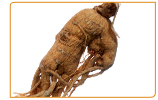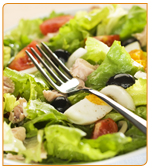Is Ginseng a Phytoestrogenic Herb?
In recent years, many women suffering the effects of menopause have turned to products containing phytoestrogens for relief. Though little is known about the plant compounds, they are thought by many to replace estrogen as the hormone declines during menopause — relieving a host of the condition’s symptoms.
As they look to often obscure herbs, however, many women are surprised to find that a relatively well-known herb — ginseng — is rich in phytoestrogens. In fact, the plant has been used for ages by traditional cultures for the treatment of many women’s health issues, including menopause.
Keep reading to learn more about ginseng and its estrogenic properties.
What is Ginseng?
 An age-old staple of Chinese medicine, ginseng has only recently (relatively speaking) arrived on the scene in the West for its reported curative properties. While the herb is used primarily as an energy-booster, it has been increasingly touted for its reported ability to relieve many of the symptoms of menopause.
An age-old staple of Chinese medicine, ginseng has only recently (relatively speaking) arrived on the scene in the West for its reported curative properties. While the herb is used primarily as an energy-booster, it has been increasingly touted for its reported ability to relieve many of the symptoms of menopause.
So, why is this the case? Ginseng is thought to tackle menopause on two fronts. Phytoestrogens in the herb combat the primary reason for most menopause symptoms: hormonal imbalance. But then, ginseng pulls out its secret weapon: ginsenosides. These compounds boost energy and mental function, providing further relief for menopause symptoms like fatigue, insomnia and forgetfulness.
Are There Risks?
The old adage “everything in moderation” also applies to ginseng. While no studies have conclusively linked the herb to any illnesses, there have been some tests that have linked prolonged use to an increased risk of breast cancer. The same applies to all estrogenic herbs, however.
 If you’re skittish about using ginseng, you do have plenty of alternatives. Non-estrogenic herbs like macafem stimulate the body’s natural production of hormones, without the side effects of estrogenic herbs. Making changes to your lifestyle like eating more balanced foods and exercising more are also surprisingly effective. A healthy body also produces healthy levels of estrogen and progesterone, providing at least some relief to menopausal symptoms.
If you’re skittish about using ginseng, you do have plenty of alternatives. Non-estrogenic herbs like macafem stimulate the body’s natural production of hormones, without the side effects of estrogenic herbs. Making changes to your lifestyle like eating more balanced foods and exercising more are also surprisingly effective. A healthy body also produces healthy levels of estrogen and progesterone, providing at least some relief to menopausal symptoms.
Of course, always speak with a qualified medical professional before beginning a treatment regimen for your menopause symptoms.
Get informed about herbs for menopause. Click the following link for more information on ginseng.



























